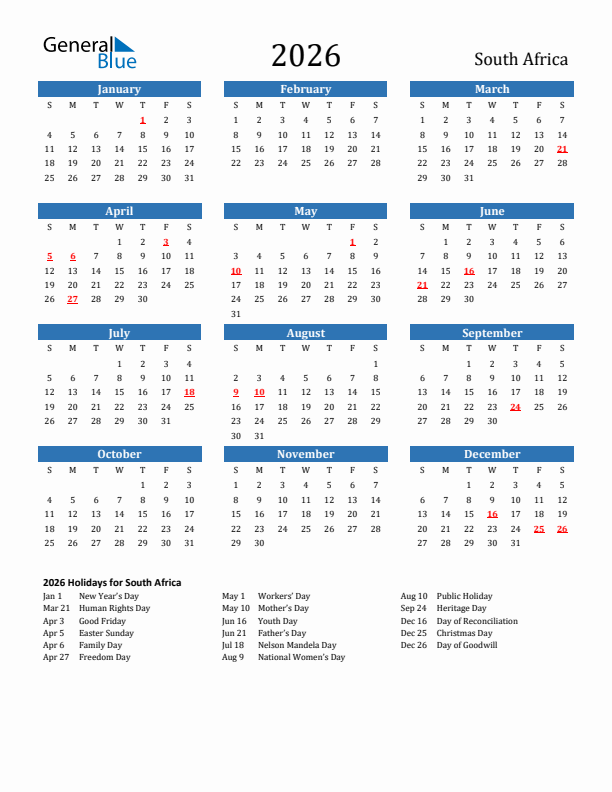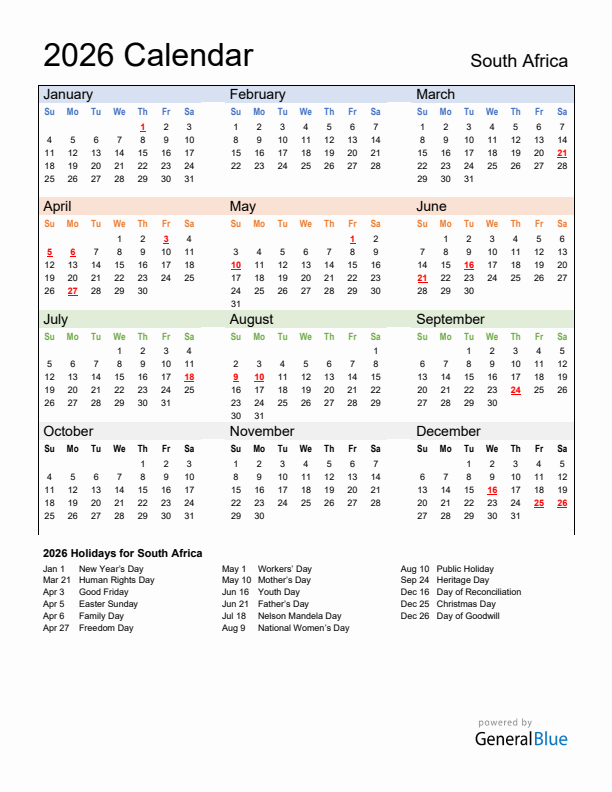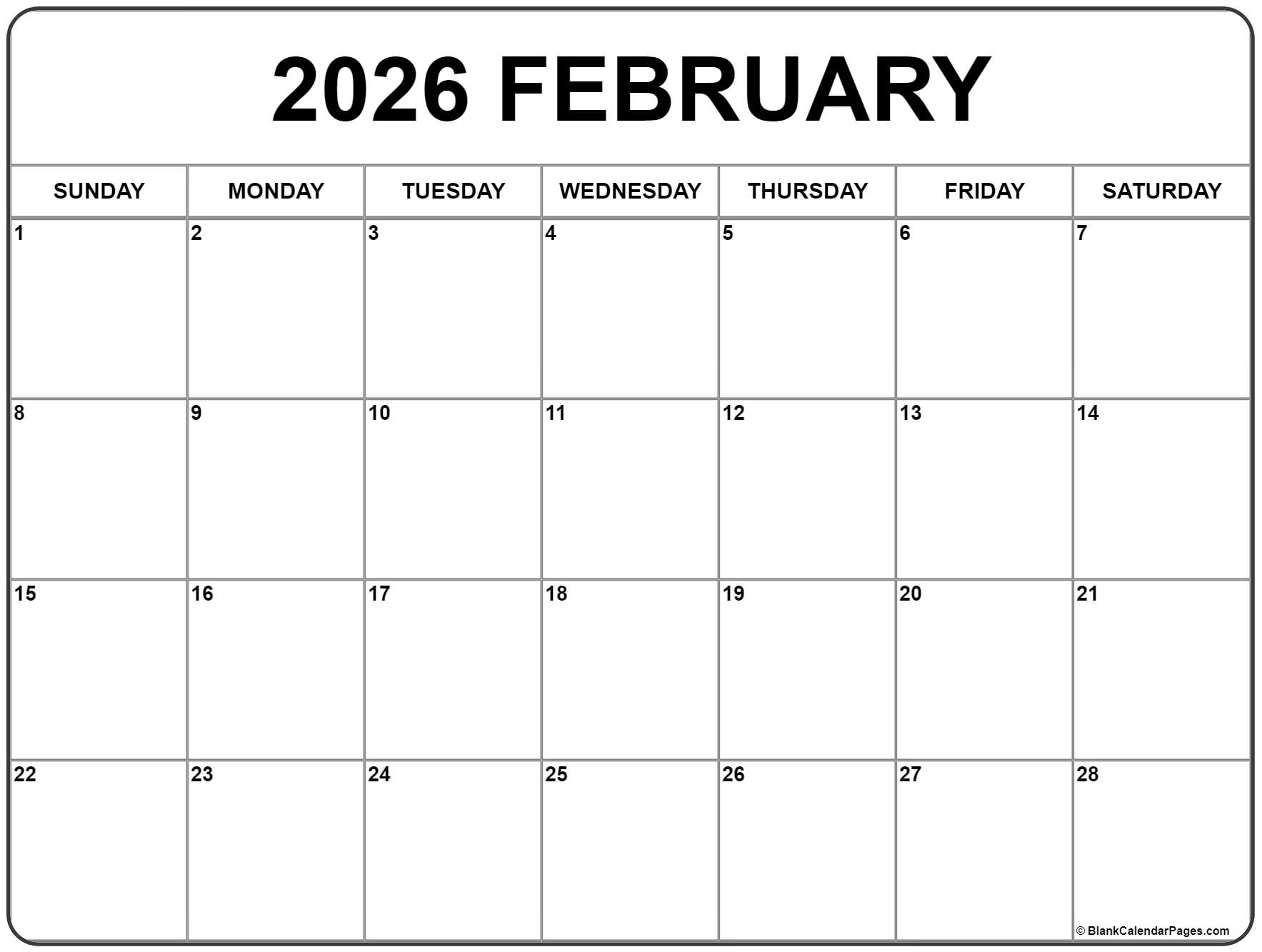South Africa in 2026: A 12 months of Reflection, Celebration, and Progress

Because the world continues its journey into the latter half of the 2020s, South Africa stands poised on the precipice of 2026, a yr brimming with potential for development, reflection, and celebration. This text delves into the calendar yr 2026, focusing particularly on the vacations and important dates that form the South African expertise. We’ll discover the historic and cultural significance of those observances, look at how they’re sometimes celebrated, and contemplate the broader context of those holidays inside the socio-political panorama of the nation.
A Calendar Steeped in Historical past and Tradition: South African Holidays
South Africa’s vacation calendar is a wealthy tapestry woven from threads of its numerous historical past, cultural traditions, and ongoing pursuit of social justice. From commemorating pivotal moments within the battle in opposition to apartheid to celebrating the nation’s vibrant cultural heritage, every vacation holds a novel significance for South Africans.
This is an in depth have a look at the foremost public holidays in South Africa for 2026 (topic to official proclamation, dates are based mostly on customary calendar calculations):
-
New 12 months’s Day (January 1st, Thursday): As in a lot of the world, South Africa welcomes the New 12 months with celebrations, resolutions, and a way of hope for the longer term. It is a time for household gatherings, braais (barbecues), and reflection on the yr passed by. Many South Africans reap the benefits of the summer season climate to get pleasure from outside actions and festivities. Coastal cities like Cape City and Durban are notably standard locations for New 12 months’s celebrations, providing fireworks shows and vibrant road events.
-
Human Rights Day (March twenty first, Saturday): This solemn day commemorates the Sharpeville Bloodbath of 1960, a pivotal occasion within the anti-apartheid battle. On this present day, police opened fireplace on peaceable protesters in Sharpeville, killing 69 folks and injuring many extra. Human Rights Day serves as a poignant reminder of the sacrifices made within the combat for equality and justice. It is a day for reflection on the progress made in upholding human rights in South Africa, in addition to the challenges that also stay. Commemorative occasions, academic applications, and neighborhood initiatives are sometimes organized to advertise human rights consciousness.
-
Good Friday (April third, Friday): As a nation with a major Christian inhabitants, Good Friday is a deeply important spiritual vacation. It commemorates the crucifixion of Jesus Christ and marks the start of the Easter weekend. Many South Africans attend church companies on Good Friday, reflecting on the sacrifice of Jesus and the which means of redemption. It’s a day of mourning and solemn remembrance.
-
Household Day (April sixth, Monday): Following Easter Sunday, Household Day supplies a possibility for households to spend time collectively, usually touring to go to relations or having fun with outside actions. It is a day for rest, connection, and strengthening household bonds. The origins of Household Day are rooted within the want for a public vacation following Easter Sunday, permitting folks to journey again dwelling after attending spiritual companies.
-
Freedom Day (April twenty seventh, Monday): This momentous day celebrates South Africa’s first democratic elections in 1994, marking the top of apartheid and the daybreak of a brand new period of freedom and equality. Freedom Day is a time for nationwide satisfaction and reflection on the lengthy and arduous journey in direction of democracy. Celebrations usually embrace parades, cultural performances, and speeches by political leaders. It is a day to recollect the sacrifices made by those that fought for freedom and to reaffirm the dedication to constructing a simply and equitable society.
-
Staff’ Day (Might 1st, Friday): Celebrated internationally, Staff’ Day acknowledges the contributions of staff to society. In South Africa, it is a day to honor the labor motion and its position in preventing for staff’ rights. Commerce unions usually manage rallies and occasions to focus on the significance of truthful wages, secure working situations, and social justice. It is a day to mirror on the progress made in enhancing the lives of staff and to advocate for additional developments in labor rights.
-
Youth Day (June sixteenth, Tuesday): This present day commemorates the Soweto Rebellion of 1976, a pivotal second within the anti-apartheid battle. On this present day, 1000’s of scholars protested in opposition to the imposition of Afrikaans because the medium of instruction in faculties. The protests had been met with brutal drive by the police, ensuing within the deaths of tons of of scholars. Youth Day serves as a reminder of the braveness and resilience of South Africa’s youth within the face of oppression. It is a day to have fun the achievements of younger folks and to handle the challenges they nonetheless face, akin to unemployment, poverty, and inequality.
-
Nationwide Girls’s Day (August ninth, Sunday): This present day commemorates the 1956 Girls’s March to the Union Buildings in Pretoria, the place 1000’s of girls protested in opposition to the move legal guidelines, which restricted the motion of black South Africans. Nationwide Girls’s Day is a day to have fun the achievements of girls in South Africa and to lift consciousness concerning the ongoing challenges they face, akin to gender-based violence, discrimination, and inequality. It is a day to advocate for girls’s rights and to advertise gender equality in all spheres of life.
-
Heritage Day (September twenty fourth, Thursday): South Africa’s cultural range is well known on Heritage Day. It is a day to embrace and have fun the traditions, customs, and languages of all South Africans. Individuals usually costume in conventional apparel, put together conventional meals, and take part in cultural occasions. Heritage Day is a reminder of the richness and complexity of South African id and the significance of preserving and selling cultural heritage.
-
Day of Reconciliation (December sixteenth, Wednesday): This present day goals to advertise unity and reconciliation between all South Africans, no matter race, tradition, or background. It is a day to mirror on the previous and to work in direction of a way forward for peace and concord. The Day of Reconciliation was established in 1995 to bridge the hole between the Afrikaner celebration of the Day of the Vow (previously generally known as the Day of the Covenant) and the African Nationwide Congress (ANC)’s celebration of Umkhonto we Sizwe (MK), the armed wing of the ANC. It is a day to acknowledge the ache and struggling of the previous and to decide to constructing a extra simply and equitable society.
-
Christmas Day (December twenty fifth, Friday): As in lots of elements of the world, Christmas Day is a serious spiritual vacation in South Africa, celebrated by Christians with church companies, household gatherings, and gift-giving. It is a time for reflection on the beginning of Jesus Christ and the message of affection, peace, and goodwill. Many South Africans additionally incorporate conventional components into their Christmas celebrations, akin to getting ready conventional meals and singing conventional carols.
-
Day of Goodwill (December twenty sixth, Saturday): The day after Christmas, Day of Goodwill is a time for extending kindness and generosity to others. It is a day to volunteer in the neighborhood, donate to charity, or just spend time with family members. Day of Goodwill is a reminder of the significance of compassion and empathy, and the necessity to create a extra caring and simply society.
Past the Public Holidays: Different Vital Dates in 2026
Whereas public holidays are probably the most well known and celebrated dates on the South African calendar, different important dates additionally maintain significance for varied communities and organizations. These dates could also be associated to spiritual observances, cultural festivals, historic anniversaries, or political milestones.
-
Non secular Observances: South Africa’s numerous spiritual panorama implies that quite a few spiritual observances are celebrated all year long. These embrace:
- Eid al-Fitr and Eid al-Adha (Islamic holidays): The dates for these holidays are decided by the lunar calendar and range every year. They’re important celebrations for the Muslim neighborhood in South Africa.
- Diwali (Hindu vacation): Celebrated in October or November, Diwali is a competition of lights that symbolizes the victory of excellent over evil.
- Rosh Hashanah and Yom Kippur (Jewish holidays): These holidays mark the Jewish New 12 months and the Day of Atonement, respectively.
-
Cultural Festivals: South Africa hosts a variety of cultural festivals all year long, showcasing the nation’s numerous heritage. These festivals usually function music, dance, meals, and artwork, offering alternatives for cultural trade and celebration. Examples embrace:
- Cape City Worldwide Jazz Competition: One of many largest jazz festivals on the earth, attracting musicians and followers from across the globe.
- Nationwide Arts Competition (Grahamstown): A serious arts competition that includes a variety of performances, exhibitions, and workshops.
- Oppikoppi (Northam): A well-liked music competition showcasing quite a lot of genres, from rock and pop to digital and hip-hop.
-
Historic Anniversaries: Anniversaries of serious historic occasions are sometimes commemorated in South Africa, offering alternatives for reflection and remembrance. These anniversaries could also be associated to the anti-apartheid battle, the nation’s transition to democracy, or different necessary moments in South African historical past.
-
Political Milestones: Election years and different important political occasions usually mark necessary dates on the South African calendar. These occasions can have a profound affect on the nation’s future and are sometimes met with intense public curiosity and debate.
The Broader Context: Holidays and the South African Socio-Political Panorama
South Africa’s holidays aren’t merely days off from work; they’re deeply intertwined with the nation’s socio-political panorama. They function reminders of the previous, celebrations of the current, and alternatives to form the longer term.
-
Reconciliation and Nation-Constructing: A lot of South Africa’s holidays, akin to Freedom Day and the Day of Reconciliation, are explicitly geared toward selling unity and reconciliation between totally different teams in society. They function alternatives to handle the legacy of apartheid and to work in direction of a extra inclusive and equitable future.
-
Social Justice and Equality: Holidays akin to Human Rights Day, Staff’ Day, and Nationwide Girls’s Day spotlight the continued struggles for social justice and equality in South Africa. They supply platforms for advocacy and activism, elevating consciousness about points akin to poverty, inequality, and discrimination.
-
Cultural Id and Heritage: Heritage Day and different cultural festivals have fun the range of South African tradition and id. They promote cultural understanding and appreciation, fostering a way of nationwide satisfaction and belonging.
-
Financial Impression: Holidays can have a major affect on the South African financial system, notably the tourism and hospitality sectors. Lengthy weekends and festive seasons usually result in elevated journey and spending, boosting financial exercise.
Wanting Forward to 2026:
As South Africa approaches 2026, it faces each alternatives and challenges. The vacation calendar will proceed to function a framework for reflection, celebration, and progress. By understanding the historic and cultural significance of those holidays, South Africans can use them as alternatives to:
- Strengthen social cohesion: Promote unity and reconciliation between totally different teams in society.
- Handle social inequalities: Advocate for insurance policies and applications that promote social justice and equality.
- Have fun cultural range: Foster cultural understanding and appreciation.
- Promote financial development: Help the tourism and hospitality sectors and create alternatives for financial improvement.
In conclusion, the calendar yr 2026 in South Africa might be formed by a wealthy tapestry of holidays and important dates. These observances will present alternatives for reflection, celebration, and progress, because the nation continues to navigate its complicated historical past and attempt in direction of a brighter future. By understanding the importance of those dates and embracing the values they characterize, South Africans can work collectively to construct a extra simply, equitable, and affluent society for all. The yr 2026 guarantees to be a yr of continued development, reflection, and celebration, constructing on the muse laid by those that got here earlier than and paving the way in which for future generations.







